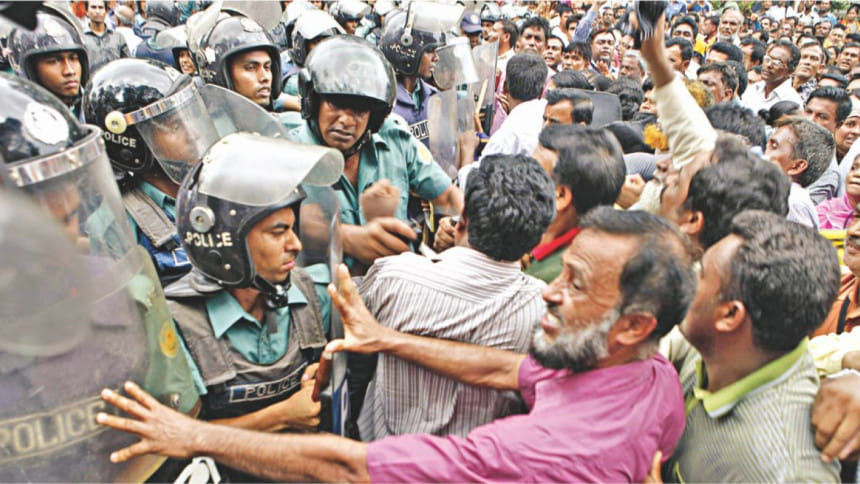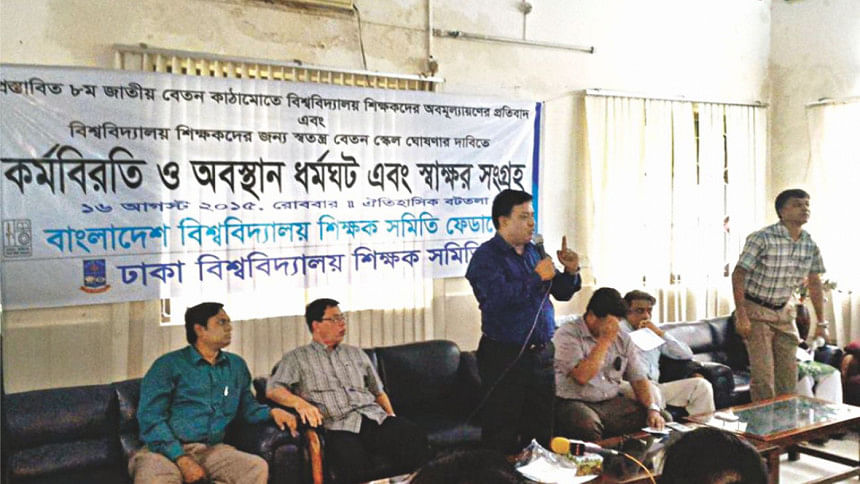From Classrooms to The Streets

Photos: Star File
In the past, students' and teachers' movements have guided Bangladesh to the path of liberation, freedom and democracy. However, it is very unfortunate that for more than six months, university teachers all over the country have taken to the street, demanding a dignified livelihood.
Teachers of all 37 public universities of Bangladesh have been protesting against the government's decision of implementing the 8th national pay scale which has downgraded their remuneration and status, they believe.
According to a Daily Star report (May 20, 2005), since independence the government of Bangladesh has revised and restructured the salaries and other benefits of its employees eight times by promulgating eight national pay scales in 45 years. Developed mainly by the bureaucrats, these pay scales, have often dissatisfied the government employees especially the university teachers.

In 1973, after announcing the first national pay scale, Bangabandhu Sheikh Mujibor Rahman, planned to upgrade the status of the university teachers who were not satisfied with the meagre salaries. He also planned to declare Dhaka University as the National University by conferring it an honorific special status. Unfortunately he was assassinated on the very day he wanted to visit Dhaka University to talk about these issues.
In 1986, teachers of all the public universities took to the street after the circulation of the third national pay scale, demanding unique pay scale for the university teachers. In the election manifesto of Awami League in 2008, it was promised that a separate pay scale for the university teachers would be formed, but the promise never came true.
According to the existing tradition, in the pay scales, statuses and salary of the university teachers have been set in comparison with the bureaucrats. For example, according to the 7th pay scale adopted in 2009, the selection grade professors that is, the senior professors of the public universities, used to get equal remuneration and statuses of a government secretary and the professors, associate professors, assistant professors and lecturers used to get remuneration and other benefits accordingly.
However, in the 8th national pay scale a major modification was made. The post of the selection grade professors was abolished. On the other hand, along with the post of a secretary, yet another post of a senior secretary was created and both included in the special grade called super grade which is higher than the post of the professors and the senior professors. Thus the statuses and salary of the professors have been downgraded at least two times in the current pay scale compared to the other government officials.
As a result, teachers of all 37 public universities under the banner of Federation of Bangladesh University Teachers' Association (FBUTA) have taken to the street and after repeated demands and peaceful protests; finally they declared full time and continuous work abstention from January 11, 2016 if the government does not withdraw the discriminatory points of the 8th national pay scale.

Professor Dr. A S M Maksud Kamal, Chairman of the Department of Disaster Science and Management, Dhaka University and the secretary general of FBUTA says, "Despite the fact that the cabinet committee decided to remove the discriminatory points of the 8th pay scale, and also agreed to accept our legitimate demands of reinstating the post and facilities cited in the 7th pay scale, the finance ministry, however, issued a notification excluding the decisions of the committee. This is infuriating and we are now struggling for survival."
The new regulations for promotion of the university teachers are also a major cause of the crisis. "Comparison of salary and statuses of the university teachers with the other government officials is quite impractical. The reason is, the promotion of the university teachers is based on scholarly research which is time consuming, on the other hand, promotion of other government officials is mainly performance based," says Dr Kamal.

According to the current legislation, if an associate professor does not have a PhD degree, s/he can apply for professorship after twenty five years of teaching and at least 10 years of teaching experience as an associate professor. S/he also has to have fifteen research articles published in the reputed journals among 7 of which have to be published during his service as an associate professor. And in case of PhD degree holders, professorship can be obtained only after twelve years of service and it is very uncommon that anybody has achieved it before fifteen years.
Again, the new pay scale says that promotion of the public university teachers will be decided by a committee under the University Grants Commission formed mainly by the bureaucrats who are not at all concerned about the academic and research activities of the universities.
As a result, the university teachers from the very beginning have been demanding a unique pay scale for them. However, they have been refused harshly. On October 4, 2015 Prime Minister criticised their movement harshly and even said, "Ask them. We have given them too much. They have no right to stop the academic activities. (The Daily Star, October 5, 2015). "
The finance minister also criticised the teachers' movement harshly and he said to the reporters on January 4, 2016, "Teachers have been continuing their protest against the 8th national pay scale without even knowing what they are getting from the pay scale." He also objected that there is nothing to give as a solution to quell the movement and teachers always take hasty decision and might go hard-line (The Daily Star, January 4, 2016).

Professor Dr A A M S Arefin Siddique, Vice Chancellor of Dhaka University says, "This problem can be solved very easily by sitting with the teachers and having an effective dialogue."
Many teachers also see this situation as a chance to reform the current rules and regulations of the university administration. Dr Sayed Saikh Imtiaz, Chairman of the Department of Women and Gender studies, Dhaka University says, "I think there should be laws to ensure that teachers of public universities will not teach in private universities. I am also strongly in favour of the argument that teachers' presence at the University during office time should be ensured."
The government's dispute with the teachers is increasing day by day. Besides university teachers, assistant teachers of primary schools have been protesting for years to increase their salary. Head teachers of government primary schools have been protesting for months with seven point demands including upgrading their status. Even the teachers of the government colleges are also dissatisfied with the pay scale. 14,000 teachers of 305 government colleges along with the secondary school teachers have staged several demonstrations from September 2015 and onwards in protest of the discriminatory points of the pay scale. Although the prime minister has directed the related ministries to examine the new pay scale's discriminatory provisions and take steps accordingly, none of the disputes have been solved yet.
It is very unfortunate that in Bangladesh teachers are treated with such negligence and indifference. The government can stop these movements by force, but the consequence will be severe. Our future generation will be educated by incapable tutors and this will ultimately destroy our nation's future.

 For all latest news, follow The Daily Star's Google News channel.
For all latest news, follow The Daily Star's Google News channel. 



Comments